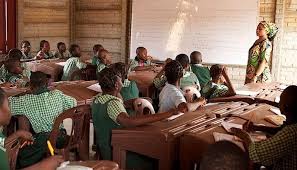In recent years, a growing trend among parents and school owners in Nigeria has been to skip the final year of primary school, known as Primary Six. This practice has been condemned by education experts, who argue that it undermines the country’s 6-3-3-4 educational policy. This system mandates six years of primary education, three years of junior secondary, three years of senior secondary, and four years of tertiary education.

At the 10th-year graduation ceremony of Al-Azeemah Schools in Magodo, Lagos, experts expressed their concerns over this emerging trend. Professor Abdulrazaq Alaro, a scholar from the Faculty of Law at the University of Ilorin, emphasized the importance of adhering to the established educational framework.
“The policy that we have adopted as a nation is 6-3-3-4,” he stated. “The irony of this issue is that many parents think a child doesn’t have to remain until the end of the sixth year, which itself is a violation of our educational policy.”
Professor Alaro highlighted the consequences of skipping Primary Six, noting that it often leads to underage admissions in secondary schools and universities. “We are appealing to parents that it is not how fast you move but how effective your movement is,” he added, stressing the importance of maturity and preparedness over speed in academic progression.
Sheikh Imran Abdulmajeed Eleha, Chief Imam of Daaru Na’im Central Mosque, also voiced his concerns at the event. He emphasized that faith-based institutions should reinforce the importance of completing the full primary education cycle. “In Islamic faith, our standard is to understand the Quran, and it is important that faith-based schools set the standard right for their students,” he explained.
Sheikh Eleha argued that the practice of skipping Primary Six undermines the foundational education that children need to succeed at higher levels of learning. “Parents are not wiser than the government that set the 6-3-3-4 academic system,” he cautioned, adding that bypassing this crucial year adversely affects students’ performance in secondary and tertiary education.
Skipping Primary Six can have several negative implications for students. Firstly, it may lead to academic under-preparedness. The final year of primary school is designed to solidify foundational skills in subjects like mathematics, English, and science, which are essential for success in secondary school. Without this crucial year, students may struggle to keep up with the demands of higher-level coursework.
Furthermore, students who advance too quickly through the educational system often find themselves lacking the emotional and social maturity required for secondary and tertiary education. This can lead to increased stress, anxiety, and even academic failure.
Mrs. Qudrah Jimoh, Director of Studies at Al-Azeemah Schools, shared her thoughts on the school’s commitment to providing a comprehensive education that meets both Islamic and Western standards. “It has been a journey of fulfilment, greatness, and success,” she stated, describing the school’s decade-long journey. “We groom them to meet both Islamic and Western education standards.”
Mrs. Jimoh announced that the school would soon launch its Junior Secondary School, beginning with the junior college for ages 10-13 years. “What we give to them is what they will bring out, as they are not dealing with any significant stress,” she explained, emphasizing the importance of a well-rounded education.
To address the issue of skipping Primary Six, stakeholders in Nigeria’s education sector must collaborate to enforce compliance with the 6-3-3-4 policy. Schools should educate parents on the importance of completing the full primary education cycle and its impact on their children’s future success.
Moreover, the government should consider implementing stricter regulations and monitoring mechanisms to ensure adherence to the national education policy. By doing so, Nigeria can ensure that its young learners receive the comprehensive education they need to thrive in an increasingly competitive world.
As the country strives to improve its educational standards, it is crucial to remember that education is not just about moving quickly through the ranks but about ensuring that each step of the journey is meaningful and effective.



